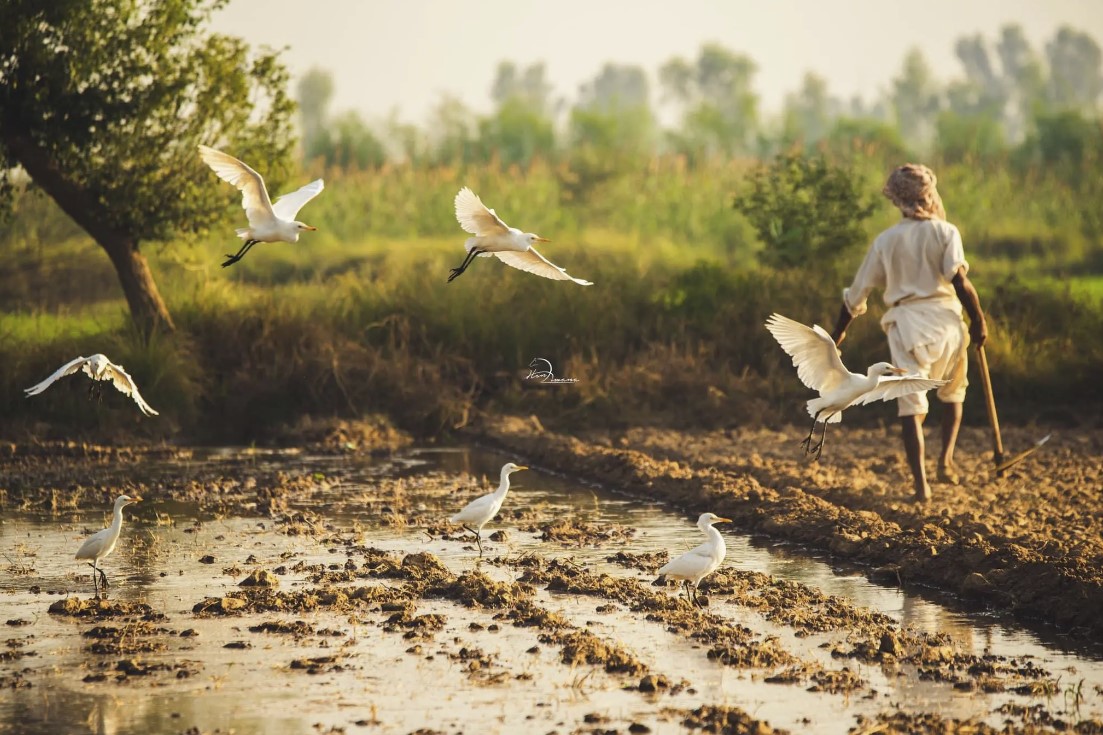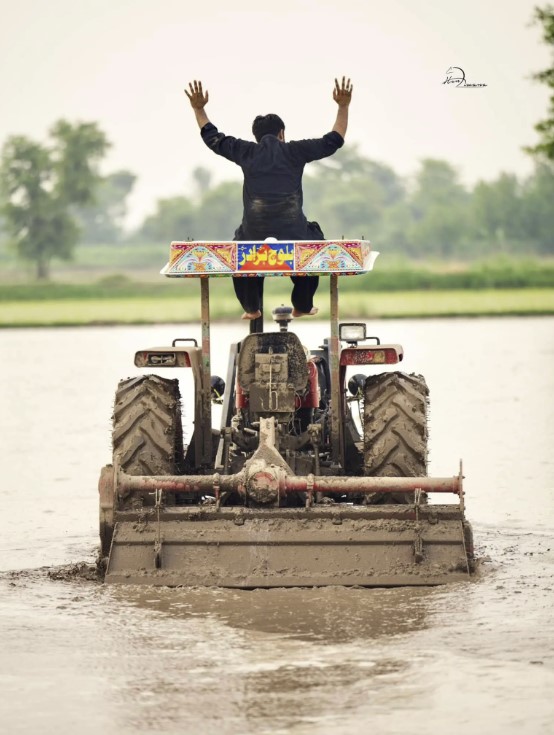You must have seen many pages on social media where the local culture of rural areas of Punjab is posted in the form of beautiful pictures and videos. One of the first youths to popularize this trend is Hasan Talal Towana.
Fields, canals, rivers, animals, birds, farmers and silent scenes of rural Punjab immersed in the evening color tell many stories in Hasan Tawana‘s photography. Immerse yourself in the scene while looking at the picture of the past that is very close to your heart. Keep looking at Hasan’s pictures on Facebook or Instagram for a while, and suddenly your heart will want to leave everything behind and return to the world we left behind in the name of ‘progress’.
Hasan Tawana provides a window through which we can peer into the past, explore our childhood, and relive the world of the past.

Hasan Tawana received great acclaim not only in Pakistan but also abroad (Hassan Tawana).
Hasan Tuana belongs to village 58 North in Sargodha. Didn’t get formal training in photography, just became a fan of passion. Today, he has become so expert in his art that he teaches the nuances of photography to students in various universities and conducts workshops.
Speaking to Independent Urdu, Hasan Tawana told about his trip that ‘from childhood he came to see farmers, how they work in difficult conditions, he wanted to show their lives and hard work to the world.’
This section contains related reference points (Related Nodes field).
Do you click along the way or do you regularly plan and go to the same place over and over again? In response to this question, he said that ‘maybe sometimes I am so lucky that I went to a place for the first time and immediately took a picture. Never felt nervous.’
Hasan Tawana was well received not only in Pakistan but also abroad. Several embassies have organized an exhibition of his photographs. He also decorated the PIA calendar with his pictures.

Hassan did not capture the disappearing scenes, but recreated the activities that have become part of the past and then preserved them with the eye of the camera (Hassan Tawana).
On the love received from cross-border Punjab, Hasan Talal Towana says, ‘When I started, the biggest response came from the Sikh community of Indian Punjab, the cricketers, singers, sectors and other people there got a lot of love. gave Maybe I’m more popular there than here. Most people start crying.’
His fans range from the common man to Indian celebrities like Sonam Bajwa and Shikhar Dhawan.
How to make pocket money with photography?
People buy prints of my photos, put them up in hotels, most of the buyers are Pakistanis living abroad. I recreate and show them what they saw in their childhood.’
He further says that ‘Life is changing very quickly, many things have disappeared before our eyes, I want to preserve them. Tools that have been a part of our farmers’ lives for the past hundred years, to suddenly throw them away now that a new machine has arrived hurts an artist. I want to preserve from the camera’s eye all the scenes that are in danger of being erased.’
Hasan not only captured the disappearing scenes but also recreated the activities that have become part of the past and then preserved them with the eye of the camera. For example, children flying kites from trees, or depictions of children engaged in various traditional sports.
Hasan Tawana’s photography universe is vast, emotional and full of quality. Visiting their wall is like having a therapy session, a relaxation that never comes back.
#Photographer #capturing #scenes #Punjabs #rural #culture
What techniques do you use to capture the essence of rural Punjab in your photographs?
**Interview with Hasan Talal Towana: Capturing the Heart of Rural Punjab**
**Editor:** Thank you for joining us today, Hasan. Your photography of rural Punjab has touched many lives across borders. What inspired you to start documenting the culture and landscapes of your homeland?
**Hasan Talal Towana:** Thank you for having me. My inspiration came from my childhood experiences. Growing up in village 58 North in Sargodha, I often observed the hard work of farmers under difficult conditions. I felt a strong desire to share their stories and the beauty of our rural environment with the world. It’s about preserving a way of life that is fading away as we rush towards modernization.
**Editor:** It’s fascinating how your work resonates so deeply with people. Can you tell us more about the stories behind your photographs?
**Hasan:** Each photograph I take aims to evoke memories and emotions. Fields, rivers, and the simple daily lives of farmers create a vivid narrative. For instance, when I capture a sunset over the fields, it reminds many of a simpler time—a time they may wish to return to. This connection to the past is crucial, and I hope my images serve as a window into those cherished moments.
**Editor:** You mentioned that you have not received formal training in photography. How did you develop your skills?
**Hasan:** It’s true; I didn’t have formal training. My passion for photography was my greatest teacher. I spent hours experimenting with my camera, learning from my environment. Over time, I became proficient enough to start teaching photography at local universities and conducting workshops. It’s rewarding to pass on what I’ve learned to others.
**Editor:** Your work has gained significant acclaim, not just in Pakistan but also internationally. How do you feel about the response you’ve received, particularly from the Sikh community in India?
**Hasan:** The love I’ve received has been overwhelming. When I started, I was pleasantly surprised to find a passionate response from the Sikh community in Indian Punjab. Many of them expressed deep emotional connections to my work, often telling me how it reminds them of their roots. It’s heartwarming to know that my photography transcends borders and resonates with so many people.
**Editor:** You’ve also mentioned that you’ve had exhibitions organized by several embassies. What has been your most memorable experience related to your exhibitions?
**Hasan:** One of my most memorable experiences was an exhibition where I met people from various walks of life—artists, scholars, and even diplomats—all of whom connected with my work. Hearing their stories and discussions about my photography was incredibly fulfilling. It reinforces my belief in the power of art to bring people together and foster understanding.
**Editor:** Lastly, what advice would you give to aspiring photographers looking to capture the essence of their cultures?
**Hasan:** My advice would be to find your voice and tell your story passionately. Focus on what moves you, whether it’s landscapes, people, or traditions. Be patient and willing to learn from each experience. Most importantly, don’t be afraid to express your emotions through your art—it’s those feelings that will resonate with others.
**Editor:** Thank you, Hasan. Your insights and dedication to preserving the culture of rural Punjab through photography are truly inspiring. We look forward to seeing more of your work in the future.
**Hasan:** Thank you for the opportunity to share my journey. I’m excited to continue exploring and capturing the beauty of our heritage.


